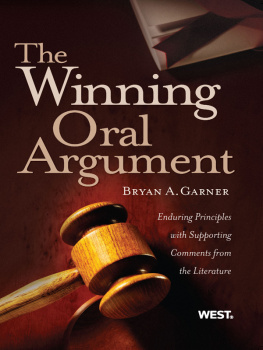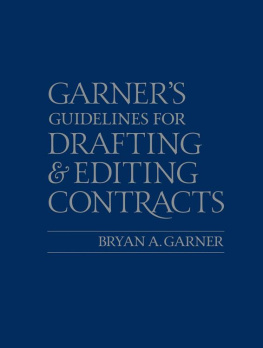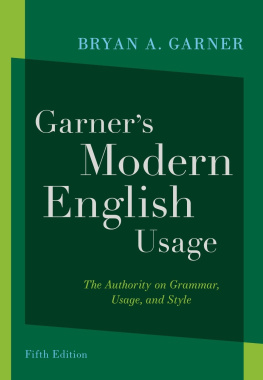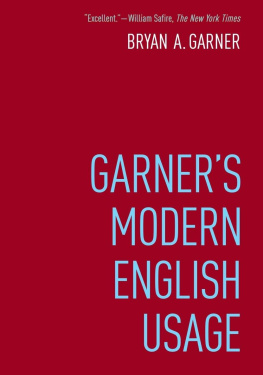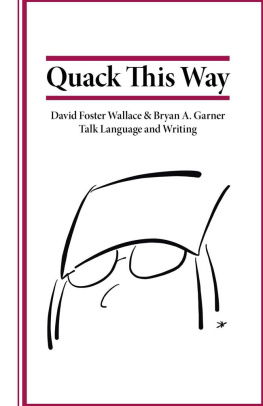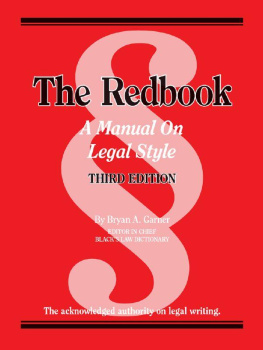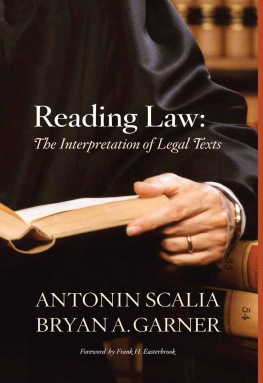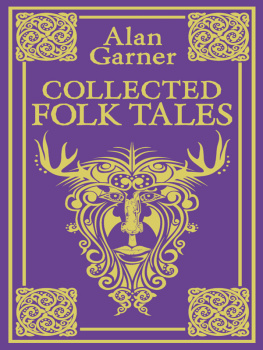Landmarks
Page list

i
THE WINNING ORAL ARGUMENT
iii
Published by
Thomson/West
610 Opperman Drive
P.O. Box 64526
St. Paul, MN 55164-0527
1-800-328-9352
2009 Bryan A. Garner.
All rights reserved. Published 2009.
Printed in the United States of America.
ISBN: 978-0-314-19885-3
Library of Congress Cataloguing-in-Publication Data
Bryan A. Garner
The winning oral argument 2nd ed.
p. cm.
Includes bibliographical references and index.
1. Law United States Methodology.
2. Oral pleading United States.
3. Appellate procedure United States.
I. Garner, Bryan A.
II. The Winning Oral Argument.
Layout by Jeff Newman
Copy Hoefler Text 10/12
Headings Hoefler Black 12/13
ii
The Winning Oral Argument
Enduring Principles
with Supporting
Comments from
the Literature
BRYAN A. GARNER
v
No one can attain a character for
wisdom and eloquence without the
greatest study, industry, and learning.
Cicero
The art of persuading human beings
including judges has remained
pretty consistent through the years.
Roy L. Steinheimerjr.
You may hear or believe that oral
argument is an art. To a degree, that
is true, but it is irrelevant. Whatever
your experience or inborn skill, the
fundamentals count. Observe them,
and you will improve your artistry.
GaryL. Sasso
It is surprising how often
counsel, even of mature years,
violate the most elementary
principles of oral argument.
Ben W. Palmer
Long experience of sitting as
Judge in an inferior court has
led me to believe that it is not
necessary or convenient that the
advocacy should also be inferior.
Hon. Edward Abbott Parry
vi
Books Written or Edited by Bryan A. Garner
Blacks Law Dictionary (all current editions)
Garners Modern American Usage
Making Your Case: The Art of Persuading Judges
(with Justice Antonin Scalia)
Garner on Language and Writing
(foreword by Justice Ruth Bader Ginsburg)
A Dictionary of Modern Legal Usage
The Redbook: A Manual on Legal Style
The Elements of Legal Style
The Winning Brief
The Winning Oral Argument
Legal Writing in Plain English
Guidelines for Drafting and Editing Court Rules
A Handbook of Basic Law Terms
A Handbook of Business Law Terms
A Handbook of Criminal Law Terms
A Handbook of Family Law Terms
The Oxford Dictionary of American Usage and Style
The Rules of Golfin Plain English
(with Jeffrey S. Kuhn)
A New Miscellany-at-Law
(by Sir Robert Megarry)
Texas, Our Texas: Reminiscences of The University
(an anthology of autobiographical essays)
vii
For judge Thomas M. Reavley
mentor in chief
ix
Preface
Glance first at the bibliography at the back of this book, and then imagine my astonishment, when reading my 250th or so article on oral argument, to find a recent essay beginning with these words: There is scant literature on the subject of oral argument. In truth, the author merely had scanty knowledge of the copious literature.
This book has its origins in my research for another book, Making Your Case: The Art of Persuading Judges , which I coauthored with Justice Antonin Scalia. Before I undertook that joint project, the only major component of judicial persuasion that Id never written about, and for which Id never canvassed the literature, was oral argument. And so I began reading every relevant piece I could find.
As in my other research projects, such as The Winning Brief I found great wealth in the literature. But the gems of advice lay buried in dozens of articles and books, many of them little-known, and some of the best advice could be excavated only through tremendous exertion. My goal was to codify the principles and illustrate them with the wisest, pithiest formulations in support of the principles. Thats what Ive tried to do, in hopes that the book will benefit both those who read it systematically and those who just browse through it from time to time. I like browsable books, and this one seems especially browsable.
As in all my scholarly endeavors, Im grateful to the late Roy M. Mersky of the University of Texas School of Law, who as director of the Tarlton Law Library generously made the resources and staff of that great institution available to me. Jeanne Price, the librarys associate director for patron services, and Leslie Ashbrook, a Tarlton Fellow, arranged to have dozens of articles sent to me in Dallas. Meanwhile, several appellate practitioners sent me their entire files of articles on oral argument as I was preparing the first version of the book, which was privately printed by LawProse, Inc. My sincere gratitude goes to Jordan B. Cherrick of St. Louis, Jeffrey I. Ehrlich of Los Angeles, Benjamin G. Shatz of Los Angeles, and Scott P. Stolley of Dallas. They jump-started my research and made it possible for me to complete this book in the span of seven months. Since then, useful materials have alighted in my mailbox from various friends, including Gideon Kanner of Los Angeles.
If any reader knows of a good source on oral argument not cited here, Id be grateful to have it: send the article or citation to bgarner@lawprose.org.
x
At LawProse, my colleagues Jeff Newman and Tiger Jackson were monumentally helpful. Jeff edited the text, designed the pages, and spearheaded the production. Tiger verified the citations and prepared the index. The spadework that goes into producing a sound book is greater than most people imagine, and Im thankful for the excellent help that Jeff and Tiger have given me. Additionally, Arrissa Meyer and Laurie Velasco of S.M.U. Law School helped in proofreading.
Ive been studying appellate arguments for a long time. When I was an undergraduate in Austin, Chief Justice Joe R. Greenhill of the Supreme Court of Texas, the colleague and friend of my late grandfather, Justice Meade F. Griffin, twice had me as his guest at oral arguments in the Supreme Court of Texas. He generously introduced me to the entire Court, including two notable authorities quoted in this book: Justices Jack Pope and Franklin Spears. Later, I was heavily involved in moot-court activities in law school, as both advocate and judge. As law clerk to Judge Thomas M. Reavley of the Fifth Circuit, I was part of an experiment in which the law clerks served also as bailiffs. I saw many oral arguments up close in those days, including some breathtaking performances by Arthur Miller and Michael Tigar. Judge Reavley often talked with me about effective and ineffective advocacy, and weve continued that conversation through the years. In full-time practice in the late 1980s, I had my share of oral arguments, and Ive done some since. Over the years, Ive continued to watch arguments intently, in courts at all levels throughout the country and some in England as well.
An oral argument has the potential for magic. Its the thrill of an intellectual and moral competition. Which side has outprepared the other? One usually does. Which side has it right? Often you cant really tell and wont really know for many months. But its always fascinating to watch and predict.
Bryan A. Garner
Dallas, Texas
July 2008
xi
Table of Contents
xii
xiii
xiv
xv
Introduction
(a) Classic statement 1. [T]he desirability of a full exposition by oral argument in the highest court is not to be gainsaid. [A]side from cases of exceptional difficulty, the impression that a judge has at the close of a full oral argument accords with the conviction which controls his final vote. Hon. Charles Evans Hughes, The Supreme Court of the United States 61, 6263 (1928).

